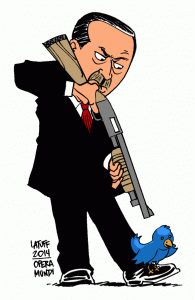“Follow me at your own risk.” This is the disclaimer Brazilian cartoonist Carlos Latuff now displays as part of his Twitter bio in response to the recent ban of his website by the Turkish government. The artist recently sat down with Today’s Zaman to talk about the necessity of his craft and how free expression is becoming more difficult in countries like Turkey and Brazil, where citizens continue to be actively silenced by their respective governments.
The artist, whose subject matter often covers politics and events in the Middle East and Turkey, such as the violence of the Israeli-Palestinian conflict and the abuse of power exercised by Turkey’s President Recep Tayyip Erdogan, is no stranger to negative attention from government authorities. His website was recently blocked in Turkey, and his cartoons have been pulled from Facebook. “I face pressure from local [state] government, specially the police forces, every time I make cartoons exposing police brutality, which in Brazil is an endemic plague,” said Latuff. “I have been forced to give explanations in police stations about my cartoons on police brutality and corruption three times.”
Despite the backlash that the cartoonist has faced from authorities around the world, he still remains one of the most popular cartoonists in Turkey due to the accuracy with which he depicts their political situation. “I have always had an interest in international affairs, since I was a kid,” comments Latuff. “I would listen to foreign radio stations on my short wave radio. It was always fascinating to know what is happening abroad. Now, with the Internet, the world is just around the corner.”
 As the Latuff notes, new forms of communication like social media have not only opened up the way that people can learn information, but they have also improved the way that people can disseminate information and express themselves. In spite of regional restrictions on social media or news broadcasts, which impede the flow of information, “through social media interactions today, it has become quite easy to get in touch with events all over the world first hand, getting in touch with journalists, think tanks, bloggers or even people who are directly involved in social and political events that might have something to say,” Latuff says.
As the Latuff notes, new forms of communication like social media have not only opened up the way that people can learn information, but they have also improved the way that people can disseminate information and express themselves. In spite of regional restrictions on social media or news broadcasts, which impede the flow of information, “through social media interactions today, it has become quite easy to get in touch with events all over the world first hand, getting in touch with journalists, think tanks, bloggers or even people who are directly involved in social and political events that might have something to say,” Latuff says.
And for Latuff being able to speak and think freely is important. “Turkey isn’t a place for free minds,” and “those who dare to speak against [Brazil’s police force] will invariably face some kind of reprisal” — often in the form of censorship. In spite of the fact that he has faced such negative — and very public — backlash, Latuff continues to produce work because “We are living at a time where authoritarian speeches are galvanizing the masses, especially when associated with religious discourse.”
Latuff adds:
We are living dangerous times in which hate speech is mistaken for freedom of speech, with a growing hatred for Muslims and immigrants in Europe and the U.S. Cartoonists who make cartoons of the Prophet Muhammad naked are praised, while cartoonists who make cartoons criticizing the Israeli apartheid are punished. Cartoonists who make cartoons of political figures suffer censorship and get arrested. These are difficult times for free minds.
Read the full interview with Today’s Zaman here.
We need your help to keep fighting for the right to read! Help support CBLDF’s important First Amendment work by visiting the Rewards Zone, making a donation, or becoming a member of CBLDF!
Contributing Editor Caitlin McCabe is an independent comics scholar who loves a good pre-code horror comic and the opportunity to spread her knowledge of the industry to those looking for a great story!